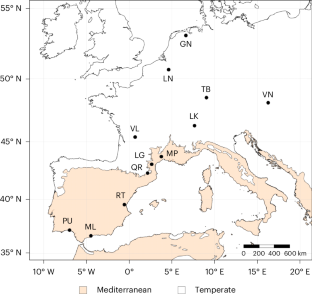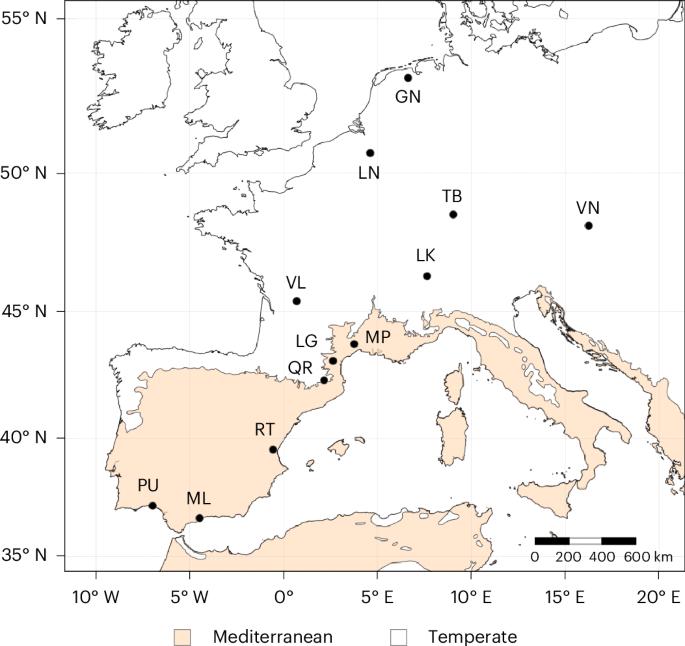欧洲亚种果蝇对全球变暖的进化反应加快
IF 29.6
1区 地球科学
Q1 ENVIRONMENTAL SCIENCES
引用次数: 0
摘要
在全球变暖的情况下,生态发生不可逆转变化的风险越来越大,这促使人们需要了解生物适应这种变化的能力。在这里,我们利用对欧洲果蝇种群的重新调查方法表明,在过去的 20 年中,已知的对全球变暖的进化反应与区域变暖同步加快。这种遗传响应完全是通过利用已有的变异--而不是新的反转--来实现对高温的耐受性。据预测,到 2050 年代中期,温带种群将向典型的地中海染色体组成靠拢,届时这种典型的陡峭遗传系谱将消失。我们的研究结果表明,地理范围广、种群规模大、遗传多样性高的物种可能具有应对气候变化的进化潜力。本文章由计算机程序翻译,如有差异,请以英文原文为准。


Acceleration of Drosophila subobscura evolutionary response to global warming in Europe
The increasing risk of irreversible ecological transformation under global warming has boosted the need to understand the capacity of organisms to adapt to this change. Here, using a resurvey method of populations of the European fly Drosophila subobscura, we show that a known evolutionary response to global warming has accelerated in the past 20 years, in step with regional warming. This genetic response has come entirely by resorting pre-existing variation—and not from novel inversions—for tolerance to high temperature. Temperate populations are predicted to converge to the typical Mediterranean chromosomal composition by the mid-2050s, at which point this classic example of steep genetic cline will have vanished. Our results suggest that species with broad geographic ranges, large population sizes and high genetic diversity may have the evolutionary potential to cope with climate change. The authors resurvey data from the present, late 1960s and late 1990s to understand the evolution of European Drosophila fly populations. They show that genetic changes in temperate regions have accelerated in line with warming and come from pre-existing rather than new variation.
求助全文
通过发布文献求助,成功后即可免费获取论文全文。
去求助
来源期刊

Nature Climate Change
ENVIRONMENTAL SCIENCES-METEOROLOGY & ATMOSPHERIC SCIENCES
CiteScore
40.30
自引率
1.60%
发文量
267
审稿时长
4-8 weeks
期刊介绍:
Nature Climate Change is dedicated to addressing the scientific challenge of understanding Earth's changing climate and its societal implications. As a monthly journal, it publishes significant and cutting-edge research on the nature, causes, and impacts of global climate change, as well as its implications for the economy, policy, and the world at large.
The journal publishes original research spanning the natural and social sciences, synthesizing interdisciplinary research to provide a comprehensive understanding of climate change. It upholds the high standards set by all Nature-branded journals, ensuring top-tier original research through a fair and rigorous review process, broad readership access, high standards of copy editing and production, rapid publication, and independence from academic societies and other vested interests.
Nature Climate Change serves as a platform for discussion among experts, publishing opinion, analysis, and review articles. It also features Research Highlights to highlight important developments in the field and original reporting from renowned science journalists in the form of feature articles.
Topics covered in the journal include adaptation, atmospheric science, ecology, economics, energy, impacts and vulnerability, mitigation, oceanography, policy, sociology, and sustainability, among others.
 求助内容:
求助内容: 应助结果提醒方式:
应助结果提醒方式:


